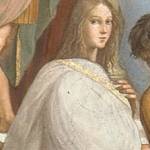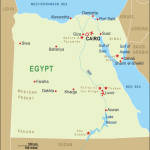
The image is Raphael’s version of Hypatia, the astronomer, mathematician, and neoplatonic philosopher who was murdered by a religious mob in 415.
Hypatia lived and died in Alexandria, Egypt, then a clashing hotbed of philosophical schools and rising radical religion. The rising radical religion of the time was Christianity.
Hypatia’s nemesis was Cyril, Bishop of Alexandria and leader of a fanatical group of Christian activists. The Christians lived their mission of converting everyone, by whatever means, to their doctrine. Under Cyril’s leadership, the Christians accused Hypatia of paganism and witchcraft, threw stones at her allies, and became increasingly violent until a violent Christian mob killed her, dismembered her body, and burned it on a pyre.
(Here is a recent encomium for now-Saint Cyril of Alexandria, “a guardian of the true faith,” by Pope Benedict XVI. For an unflattering portrait of Cyril, Agora is a worth-watching movie about Hypatia’s life and death.)
Those were the bad old days.

Fast forward 1,600 years to Egypt now and the resurgent Muslim Brotherhood. The MB movement was founded in Egypt in 1928 by Hassan al-Banna (also an admirer of Adolf Hitler and the National Socialists), and it has led a mostly-underground existence since then. In the second half of the twentieth century, Sayyid Qutb became the MB’s leading intellectual voice and his Milestones its manifesto:
“When Islam strives for peace, its objective is not that superficial peace which requires that only that part of the earth where the followers of Islam are residing remain secure. The peace which Islam desires is that the religion (i.e., the Law of the society) be purified for God, that the obedience of all people be for God alone” (Milestones, p. 63).
(Muhammad Qutb, Sayyid’s younger brother, was a university professor in Saudi Arabia, where one of his students was Osama Bin Laden.)
The ousting of Egypt’s thug-president Hosni Mubarak has led to a power vacuum, and the Muslim Brotherhood’s has now become a potent political force in Egypt. The MB’s motto: “Allah is our objective. The Prophet is our leader. Qur’an is our law. Jihad is our way. Dying in the way of Allah is our highest hope.”
So how different is Egypt 1,600 years later? And whither Egypt’s philosophers, scientists, and independent thinkers?
Related:
The Philosopher’s Zone program on “Egypt, the Muslim Brotherhood and Sayyid Qutb.”
A useful primer: “The Muslim Brotherhood in the Arab World and Islamic Communities in Western Europe.”
Virgina Murr’s essay on Qutb and Al Qaeda, “The Power of Ideas: Sayyid Qutb and Islamism” [pdf].
Ayaan Hirsi Ali’s The Wall Street Journal article, “The Quran Is Our Law; Jihad Is Our Way.”
Professor: the comparison is even stronger given the recent destruction-by-arson of the L’Institut d’Egypte.
Indeed, Lorenzo. Thanks for the link.
Stephen I’m intrigued by your account account of the death of Hypatia and recommendation of Agora.
You might find the following two articles of some interest:
one and two
To cut a long story short, the film Agora shares something with post modernism.
Thanks for the good links, TDK. I share your misgivings about the movie’s accuracy, and so while I liked it as drama and historical fiction, I recommended it above only as a portrait of Cyril.